
Our Addiction Resources
Navigating the world of addiction and recovery can be overwhelming. We’re here to provide clear, compassionate education and guidance. From practical advice for maintaining sobriety to informational guidance on the long-term effects of substance abuse, our content is a beacon of hope and understanding.
Our Team is Ready are ready to take your call
Call us Today!
or we can call you. Fill out form below
Our Blog
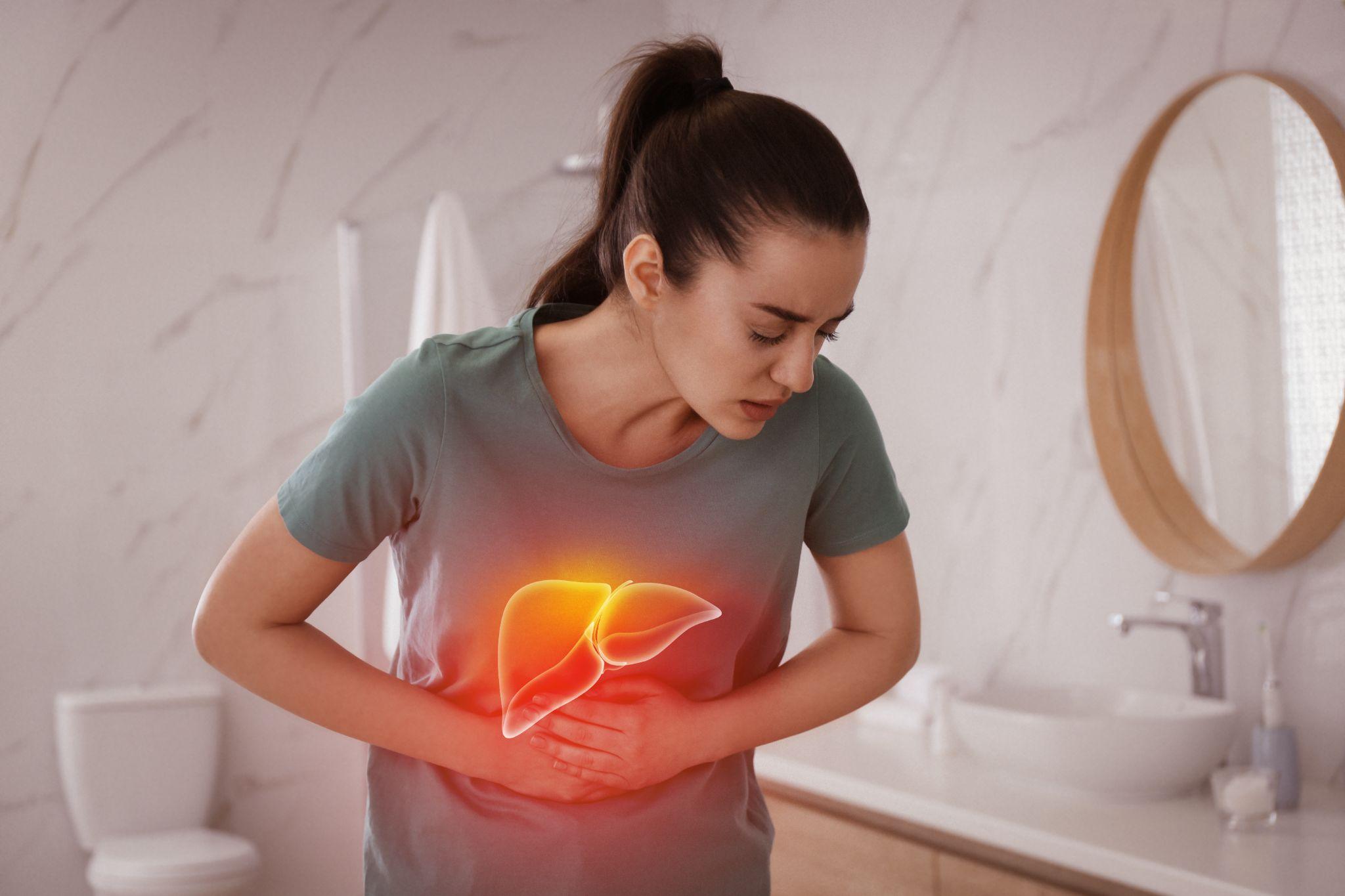
Your Guide to Alcohol-Associated Liver Disease
Alcohol consumption is a common part of social life in the United States, but whether excessive or binge drinking occurs, it can take a severe toll on the body, particularly the liver. Alcohol-associated liver disease (ALD) is a direct result of long-term, excessive drinking.
For people with alcohol addiction or for loved ones who are concerned, understanding the risks and consequences of alcohol and liver disease is essential. Early intervention and recovery are crucial to preventing irreversible damage.
What Is Alcohol-Associated Liver Disease?
Alcohol-associated liver disease refers to a range of conditions that result from prolonged alcohol abuse. The three types of liver disease range in severity and include fatty liver, alcoholic hepatitis, and cirrhosis:1
1. Fatty Liver (Steatosis)
This is the earliest stage of alcohol-related liver disease. It occurs when fat builds up in the liver due to excessive drinking. At this stage, there may not be any noticeable symptoms, but the damage is already happening. Fortunately, fatty liver can be reversed if any amount of alcohol use is stopped early enough.
2. Alcoholic Hepatitis
If one doesn’t stop drinking alcohol, inflammation of the liver, known as alcoholic hepatitis, may develop. Symptoms of alcoholic hepatitis include jaundice (yellowing of the skin and eyes), abdominal pain, nausea, and vomiting. This stage of liver disease is more severe than fatty liver and may require medical intervention.
3. Cirrhosis
The most advanced form of ALD is cirrhosis. This is when healthy liver tissue is replaced by scar tissue, which impairs the liver’s ability to function. At this stage, liver damage is often irreversible, and the risk of liver failure, cancer, and death increases significantly.
How Is Alcohol-Associated Liver Disease Caused?
To understand how alcohol harms the liver, it’s important to first know the liver’s key role in overall health. Located on the right side of the abdomen beneath the ribs, the liver performs vital functions, such as producing bile to help digest fats, metabolizing nutrients like carbohydrates, fats, and proteins, and producing necessary substances for blood clotting. Additionally, the liver acts as a filter, removing harmful toxins—including alcohol—from the bloodstream.2
When alcohol is consumed, it travels from the stomach and intestines into the bloodstream and is then transported to the liver. The liver breaks down alcohol using enzymes, but this process creates harmful byproducts that can damage liver cells.
A heavy drinker may have a buildup of fat within the liver, which can interfere with its normal function. Over time, this process also triggers inflammation and fibrosis, a condition where scar tissue forms in the liver.2
As a result, the liver becomes less capable of performing its essential functions, such as filtering toxins and metabolizing nutrients. People who drink continuously worsen this damage, often leading to advanced liver diseases such as hepatitis or cirrhosis.2

Why Recovery Is Important Now
Recognizing alcohol-induced liver damage is a vital first step. However, the urgency of taking action cannot be overstated. Here are some reasons why recovery from alcohol abuse is crucial right now:
Liver damage worsens over time. Even if someone isn’t experiencing severe symptoms yet, the disease may be advancing. The earlier someone stops drinking, the more likely they are to prevent permanent damage. For those in the early stages of fatty liver or mild alcoholic hepatitis, stopping alcohol use can reverse much of the damage.
Reducing the risk of complications. Alcohol-associated liver disease doesn’t just affect the liver. It increases the risk of other serious health problems like liver cancer, kidney failure, and cardiovascular issues. The sooner someone stops drinking, the more they lower their risk for these life-threatening complications.
Improved quality of life. Living with advanced liver disease can be painful and debilitating. Symptoms like fatigue, abdominal pain, and jaundice can severely impact daily life. Recovery not only prevents the worsening of these symptoms but can also lead to a noticeable improvement in overall well-being.
Avoiding irreversible damage. Once cirrhosis develops, liver function is significantly impaired, and the damage is often permanent. Early intervention through stopping alcohol consumption is essential to avoid reaching this point of liver failure or even a liver transplant. For those who already have cirrhosis, quitting drinking can prevent further damage and give the liver a chance to function as well as possible.
Taking the First Steps Toward Recovery
Deciding to stop drinking and start recovery is a difficult but life-saving decision. Here are some steps to begin the process:
1. Seek Medical Help
It’s crucial to see a healthcare provider, especially if liver disease is suspected. Doctors can run tests like CT scans to assess the extent of liver damage and recommend appropriate treatments. Detoxing from alcohol should be done under medical supervision, as withdrawal can be dangerous without professional support.
2. Find a Support System
Recovering from alcohol addiction is challenging, but having a support network of family, friends, and professional counselors can make a world of difference. Whether it’s through group therapy, individual counseling, or a structured rehabilitation program, support is essential for long-term success.
3. Adopt a Healthy Lifestyle
A balanced diet, regular exercise, and mental health care are all key components of a healthy recovery. Since alcohol has likely taken a toll on the body, focusing on nutrition and self-care will help the liver heal and improve overall health.
4. Stay Committed
Recovery is a long-term process that requires ongoing commitment. Even after the initial detox and early stages of recovery, individuals will need to stay vigilant to avoid relapse. Maintaining a structured routine, avoiding triggers, and continuing therapy are all important strategies for staying on the path to sobriety.
Start Your Healing Journey Today With Lumina Recovery
Alcohol-associated liver disease is a serious condition that can progress quickly if left unchecked. However, recovery is possible, and the sooner it begins, the better the outcome will be. Whether you’re someone struggling with alcohol addiction or a concerned loved one, understanding the risks and taking steps toward recovery is the best way to ensure a healthier future.
Lumina Recovery’s alcohol addiction program, combined with its therapy options, provides individuals with the crucial support and medical care needed to address alcohol-associated liver disease and promote long-term recovery before irreversible damage occurs.
Contact us today to learn how our recovery programs can help you or a loved one overcome alcohol addiction and start the healing process.
Sources:

Understanding the Risk Factors for Addiction
Addiction to alcohol and other drugs is a complex and often misunderstood condition. Whether you’re facing it yourself or watching a loved one struggle, understanding the factors that contribute to addiction can be incredibly helpful.
It’s important to remember that addiction is not inevitable, and research shows risk factors simply increase the likelihood of someone developing a substance use disorder. While no one factor guarantees that a person will develop an addiction, several common factors can increase the risk.1
By recognizing these risks, you can better comprehend the challenges involved and, more importantly, seek the appropriate support for recovery. Let’s dive into the primary risk factors for addiction, so you can have a clearer picture of what contributes to this condition.
1. Genetics
One of the most well-researched and recognized risk factors for addiction is genetics. Studies have shown that genetics can account for 40-60% of an individual’s likelihood of developing an addiction.2
If you have a family member who struggles with addiction, your own risk may be higher. This doesn’t mean that addiction is inevitable, but it does suggest that biological makeup can influence how your brain responds to substances.
Addiction can be passed down through generations, but it’s essential to understand that genetic predisposition is not the sole determining factor. Many people with a family history of addiction never develop substance use disorders, just as others without any known genetic predisposition may struggle with addiction.
2. Environment
The environment where someone grows up can have a great impact and increase their risk of developing a substance use disorder. Environmental factors such as exposure to drug use, stress, and peer pressure during formative years can play a significant role.
Growing up in an unstable or abusive household, living in a community with a high prevalence of substance use, or being part of a social circle where drug use is normalized can all increase the likelihood of addiction.
On the other hand, a supportive and healthy environment, where open conversations about mental health and substance use are encouraged, can lower this risk. It’s crucial to recognize that environmental risk factors can be mitigated with the right support systems and interventions.
3. Medical History
A person’s medical history can also play a significant role in their susceptibility to addiction. People with untreated mental health disorders, such as anxiety, bipolar disorder, attention-deficit/hyperactivity disorder (ADHD), or post-traumatic stress disorder (PTSD), may be more likely to self-medicate with substances. This can lead to an increased risk of addiction over time.
Chronic pain or other ongoing health problems can also elevate the risk of substance use, particularly if someone is prescribed painkillers or other potentially addictive medications. When medical conditions are not properly managed, the chances of dependency on prescribed drugs or illicit substances can rise.

4. Age
The age at which someone begins using substances is another important factor in addiction risk. Young people who start using drugs or alcohol are at greater risk of developing an addiction later in life. This is because the brain continues to develop during this time, making it susceptible to the negative effects of alcohol and drugs.1
Teenagers and young adults are particularly susceptible to peer pressure and may engage in substance use without fully understanding the potential consequences. Early substance use can alter the brain’s reward system, making it more difficult to control cravings and resist future substance use.
5. Type of Drug
Not all substances carry the same risk of addiction. Certain drugs, like opioids, methamphetamines, and nicotine, are more addictive than others due to the way they interact with the brain’s chemistry. For instance, opioids can quickly lead to physical dependence, as they bind to receptors in the brain that control pain and emotion.
Drugs that produce an intense high or create a sense of euphoria are often more likely to be abused. However, even drugs considered less addictive can still lead to substance use disorders if used improperly or over a prolonged period.
6. Method of Use
The way a drug is taken can also impact the risk of addiction. Snorting, smoking, or injecting drugs tend to enter the bloodstream more quickly, producing an immediate and powerful effect. This rapid delivery increases the potential for addiction since users often seek the instant gratification of a quick high.
On the other hand, substances taken orally, like pills or liquids, typically have a slower effect, which may reduce the immediacy of the high but still pose a risk when used in large quantities or for extended periods. It’s important to understand that regardless of the method of use, prolonged exposure to any substance increases the risk of addiction.
Addiction Is Not Guaranteed
It’s crucial to emphasize that these risk factors do not guarantee addiction. Many people with high-risk factors never develop substance use disorders, while others with few apparent risk factors may find themselves struggling. The presence of one or more risk factors simply indicates that a person may have a higher likelihood of developing an addiction, not that it is a foregone conclusion.
Understanding the risk factors is the first step in preventing addiction and seeking help when needed. If you or a loved one is at risk or already struggling with substance use, it’s important to seek professional guidance.
Many treatment options are available, including detox, therapy, and specialized programs, all of which can help individuals regain control of their lives and embark on the path to recovery.
Get Help in Preventing and Treating Addiction With Lumina Recovery
Addiction is influenced by genetics, environment, medical history, age, the type of drug, and the method of use. While these factors increase the likelihood of developing a substance use disorder, they do not make addiction inevitable. By recognizing these risks, you can take proactive steps toward prevention or seek the appropriate help for yourself or a loved one.
At Lumina Recovery, we treat various types of addictions while also addressing underlying mental health conditions through dual diagnosis, which is crucial for understanding how factors like genetics, environment, and medical history can contribute to both addiction and mental health struggles.
For guidance and support on the road to recovery, contact our team of specialists today.
Sources:

Signs You Might Be in Denial About Your Addiction
Denial is a powerful defense mechanism, especially for those struggling with substance abuse. It acts as a psychological barrier, preventing individuals from fully recognizing the extent of their addiction. This denial isn’t about dishonesty—it’s often rooted in unconscious processes that shield a person from the painful reality of their situation. Confronting the truth can be daunting, so many remain in denial, consciously or unconsciously, until they begin the journey of recovery.
Why Is Denial in Addiction So Common?
Denial is a common response to substance abuse because acknowledging an addiction can feel overwhelming. Facing the reality of a problem means confronting the fear, shame, and stigma associated with it. Here are a few key reasons why addiction denial is such a prevalent issue:
- Stigma: The terms “alcoholic” or “addict” carry heavy social labels, making it difficult for individuals to accept these identities due to fear of judgment or rejection.
- Shame: Many see addiction as a personal failure, feeling a deep sense of shame about their struggles, which makes it hard to admit the truth, even to themselves.
- Fear of Change: The idea of never using substances again can be terrifying. For many, substances have become a way of coping with stress or trauma, so the thought of living without them can make denial seem like an easier choice.
Denial serves as a shield against these difficult emotions, but overcoming it is often the first step toward genuine recovery.
What Does It Mean to Be in Denial?
Being in denial means refusing to accept the reality of a situation, often because that reality is too uncomfortable or painful to confront. In the context of addiction, denial can prevent individuals from acknowledging their substance use as a problem, making it difficult to see the need for change. This defense mechanism can create a barrier to seeking help, as the individual convinces themselves that their behavior is normal or justified.
Common Signs of Denial in Addiction
Denial can manifest in many ways, making it challenging for those struggling with substance use to recognize the extent of their problem. Here are some common symptoms of denial that you may notice in yourself:
Minimizing the Problem
This involves downplaying how often or how much you use a substance, even when it is clearly impacting your life. For instance, you might say, “I only drink on weekends, so it’s not a big deal,” or “I just need something to help me unwind after work.”
While these statements may seem harmless, they ignore the larger issue—such as how weekend drinking is affecting your relationships or how the “unwinding” routine is turning into a daily dependency. By minimizing the problem, you avoid facing how your substance use might be spiraling out of control.
Blaming Others
When in denial, a person might find ways to shift responsibility for their substance use onto others or external circumstances. You might think, “I wouldn’t drink so much if my job wasn’t so stressful,” or “It’s not my fault—I only use because my friends pressure me.”
This mindset allows you to avoid acknowledging your role in your behavior. Instead of addressing your own choices, you attribute them to outside factors, making it difficult to see the need for personal change.
Rationalizing Behavior
Rationalization is a common defense mechanism where you make excuses to justify substance use, even when it’s causing harm. You might tell yourself, “I’ve had a long day, so I deserve a drink,” or “Everyone has a few drinks to unwind—why should I be any different?”
These justifications can mask the true impact of your behavior. Rather than seeing the potential harm, you frame your actions as deserved or typical, allowing the cycle of use to continue unchecked.
Comparing to Others
A person in denial might draw comparisons between themselves and others with more severe addiction issues. For example, you might think, “I’m not as bad as that person—I can still handle my responsibilities,” even though your own substance use is beginning to affect your life negatively.
This kind of thinking creates a false sense of security, making it easier to ignore the warning signs in your own situation. It shifts the focus from your own needs for help or change by highlighting someone else’s struggles instead.
Ignoring the Negative Impact
This involves recognizing that you use a substance but refusing to acknowledge the harm it’s causing. For example, you might say, “I know I drink, but it doesn’t hurt anyone,” or “Sure, I use drugs occasionally, but it’s not like it’s affecting my job.”
This mindset overlooks the broader impact of your behavior—such as how it affects your relationships, mental health, or physical well-being. By ignoring these consequences, you avoid confronting the possibility that your substance use is creating more problems than you’re willing to admit.

The Role of Self-Awareness in Addiction Recovery
Developing self-awareness is a crucial part of addiction recovery. It helps individuals uncover the underlying reasons for their addiction and recognize triggers that can lead to relapse. This awareness equips them with the tools to change their thoughts, feelings, and behaviors, ultimately empowering them to overcome dependency and build a healthier life.
Self-awareness in recovery involves several key aspects:
- Recognizing Emotions: Understanding and managing emotions is vital. Many people turn to substances to cope with difficult feelings like anxiety, sadness, or anger. By learning to identify these emotions, you can find healthier ways to process and respond to them without resorting to substances.
- Understanding Thought Patterns: Self-awareness allows you to examine how your thoughts can influence your actions. For example, certain thought patterns might lead you to believe that you need a substance to relax or to cope with stress. Recognizing these patterns is the first step toward changing them.
- Connecting with Physical Sensations: Addiction often involves using substances to numb physical discomfort, such as pain or tension. Becoming more attuned to your body’s signals can help you address these sensations without turning to drugs or alcohol.
- Acknowledging Beliefs: Self-awareness also means identifying and challenging the beliefs that may drive your substance use. This could include feelings of shame, self-doubt, or beliefs like, “I can’t handle stress without drinking.” Confronting these beliefs can be transformative in building self-acceptance and resilience.
- Restoring Your Ability to Reason: Addiction can cloud judgment and undermine decision-making. Self-awareness helps restore the ability to make informed, healthy choices by understanding the true impact of substances. For instance, knowing the long-term consequences of alcohol and drugs can challenge flawed reasoning, like thinking, “I’ll focus on recovery, and then I’ll just have a few glasses of wine on the weekend.”
Self-awareness is not always easy to achieve, especially when denial is a factor. Denial can make it difficult to see the reality of your situation, but breaking through this barrier is essential for lasting change. If self-awareness feels out of reach or overwhelming, seeking professional guidance can provide the support needed to begin this journey.
What Are Your Next Steps?
Recognizing denial symptoms in yourself and that you have a substance use disorder is a significant and brave step. Here’s how to begin moving forward:
- Practice self-compassion. It’s normal to feel guilt or shame, but try to treat yourself with kindness. Remember that addiction is complex, and acknowledging your struggle is a sign of strength, not weakness. Be patient with yourself as you navigate this process.
- Reach out for support. You don’t have to face this alone. Reach out to a trusted friend, family member, or professional who can offer support. Connection can make the process less isolating and help you stay motivated.
- Educate yourself. Learn more about substance use disorders and how they impact the mind and body. Understanding what you’re facing can help you feel more in control and better prepared to make informed decisions about your recovery.
- Understand your treatment options. Explore different types of treatment, such as inpatient and outpatient programs, to find the best fit for your needs. Speaking with a counselor or healthcare provider can help you understand which options align with your recovery goals.
Taking these initial steps can help you begin your journey toward a healthier future. Remember, recovery is a process, and you are not alone.
Find Help at Lumina Recovery
Your journey is uniquely yours, and your care should reflect that. At Lumina Recovery, we meet you where you are. If you’re unsure about your substance use or feel you may be overindulging, we invite you to reach out to our compassionate team for a chat.
We’re here to listen and discuss any concerns you may have—there’s no pressure to commit to treatment.
We are dedicated to empowering lives and inspiring meaningful change by offering a transformative, holistic approach that nurtures the physical, emotional, and psychological aspects of addiction recovery.

3 Different Types of Stress and Their Effects
Stress is an unavoidable part of life. Whether it stems from work, family issues, financial concerns, or personal challenges, everyone experiences stress in one form or another. Short-term stress can be a normal, even helpful response to challenges, but long-term stress harms both mental and physical health.
Chronic stress can lead to harmful behaviors, including addiction. That is why it is important to know the different types of stress, how they affect the body, and the connection between long-term stress and addiction.
3 Types of Stress
Stress comes in many forms, but not all stress is the same. Some types of stress are short-lived and manageable, while others can persist and cause long-term harm to both mental and physical health.
The three main kinds of stress include acute stress, episodic acute stress, and chronic stress. Each type affects the body differently, but all can have serious consequences if not properly managed. Understanding the distinctions between them is key to finding healthy ways to cope.1
1. Acute Stress
Acute stress is the most common stress response. It comes on quickly in response to immediate challenges, such as narrowly avoiding an accident or preparing for an important meeting.
In small doses, acute stress can actually be beneficial, motivating us to act or adapt quickly. However, frequent episodes of acute stress can lead to physical symptoms such as headaches, stomach problems, or increased blood pressure.
2. Episodic Acute Stress
While acute stress happens in isolated moments, episodic acute stress occurs regularly. People who experience episodic acute stress may feel like they are always in crisis mode.
This type of stress often affects individuals with high-pressure jobs or those who take on too many responsibilities. Over time, it can lead to more serious health issues, such as anxiety, depression, and heart disease.
3. Chronic Stress
Chronic stress is a long-term, ongoing type of stress that feels never-ending. This type of stress can result from persistent issues such as financial problems, an unhealthy relationship, or job dissatisfaction.
Unlike acute stress, chronic stress wears down the body over time. People dealing with chronic stress may feel hopeless, trapped, or overwhelmed, which can increase the risk of developing mental health issues or turning to substance abuse as a coping mechanism.
The Harmful Effects of Long-Term Stress
While stress in short bursts can be helpful, long-term exposure to stress—particularly chronic stress—can take a toll on physical and mental health.
Physical Effects
Long-term stress affects nearly every system in the body. Symptoms of stress can lead to digestive issues, increased risk of heart disease, and impaired immune function, making the body more susceptible to illnesses.1
When stress becomes prolonged, the body continuously releases stress hormones like adrenaline and cortisol, which cause high blood pressure and increased heart rate, disrupt sleep patterns, and contribute to weight gain or muscle tension.
The constant release of stress hormones like cortisol can elevate blood pressure and blood sugar levels, leading to conditions such as hypertension and diabetes.
Additionally, chronic stress can lead to tension headaches, muscle pain, and sleep disturbances, leaving individuals physically exhausted and worn down.
Mental and Emotional Effects
Stress also plays a significant role in mental health. When exposed to chronic stress and anxiety, the brain releases a constant stream of stress hormones, which can result in anxiety, depression, and mood swings.
Over time, the brain’s ability to cope with stress diminishes, making it harder to deal with even minor stressors and feeling overwhelmed easily.
People experiencing high levels of emotional stress may turn to unhealthy coping mechanisms, such as substance abuse, to numb their feelings or escape their daily life.
Cognitive Decline
Prolonged stress can negatively affect cognitive functions such as memory, attention, and decision-making. High levels of stress hormones can impair the hippocampus, a region of the brain responsible for learning and memory.
This can lead to difficulty concentrating, forgetfulness, and a decline in overall cognitive performance. Over time, these effects can interfere with work, relationships, and daily functioning.
Stress and Addiction: The Dangerous Connection
When stress becomes overwhelming, many people turn to substances like drugs or alcohol for temporary relief, leading to a dangerous cycle. Chronic stress disrupts the brain’s natural reward system, making it harder to experience pleasure without artificial stimulation. This increases the risk of addiction as individuals self-medicate to cope with stress.
Over time, reliance on substances for stress relief can develop into addiction, making recovery more challenging. Without healthy coping mechanisms, stress becomes a significant trigger for relapse, highlighting the importance of managing stress to prevent and overcome addiction.

Managing Stress to Help Prevent Addiction
Learning healthy ways to manage stress is crucial in helping to prevent addiction and maintain long-term sobriety. Some effective strategies include:
- Exercise: Engaging in regular physical activity is one of the best methods for managing stress. Exercise stimulates the release of endorphins, natural chemicals that boost mood, reduce stress levels, and enhance overall well-being. Activities like walking, running, yoga, or swimming can significantly lower stress hormones such as cortisol and adrenaline.
- Mindfulness and Meditation: Practicing relaxation techniques like mindfulness and meditation helps individuals stay grounded and focused in the present moment. These practices can reduce the body’s stress response, lower anxiety levels, and improve emotional regulation, making it easier to handle stressful situations without turning to substances.
- Healthy Diet: Nutrition plays a vital role in how the body responds to stress. Eating a balanced diet rich in fruits, vegetables, and whole grains supports physical health and provides the energy and nutrients necessary to cope with stress.
- Sleep: Getting enough restful sleep is essential for stress management. Chronic stress often disrupts sleep patterns, leading to insomnia or poor-quality sleep, which can further exacerbate stress.
- Social Support: Building connections with friends, family, or support groups offers emotional comfort and helps alleviate feelings of isolation. Strong social connections buffer against stress, providing individuals with a sense of understanding and support.
- Therapy and Counseling: Professional support through therapy or counseling, such as cognitive behavioral therapy (CBT), can help individuals identify the sources of their stress and develop personalized strategies to manage it. For individuals with co-occurring disorders like post-traumatic stress disorder (PTSD), dual diagnosis programs offer specialized care that addresses both mental health and addiction.
Find Relief From Stress and Addiction With Lumina Recovery
Stress is a normal part of life, but when it becomes chronic or overwhelming, it can lead to serious health issues, including addiction. Understanding the different types of stress and how they affect the body is essential in managing it effectively. By developing healthy coping strategies and seeking support when needed, individuals can reduce the harmful effects of stress and avoid turning to substance abuse as a solution.
Lumina Recovery’s dual diagnosis program addresses both addiction and underlying stress-related mental health issues, providing comprehensive care for those struggling with chronic stress and substance abuse.
If you’re struggling with addiction and stress, seek professional help from Lumina Recovery today.
Source:
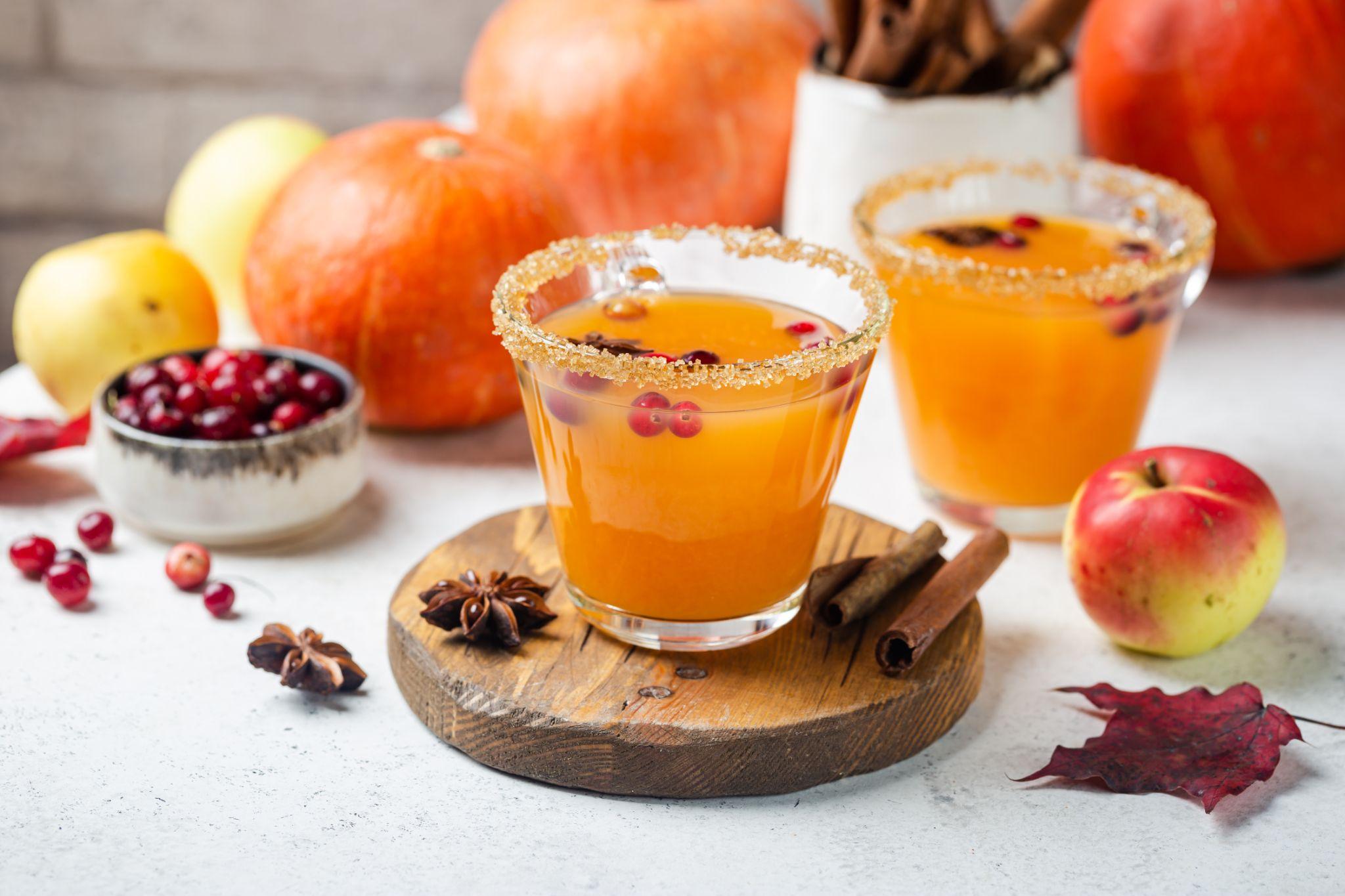
10 Festive Thanksgiving Mocktails for Sober Celebrations
Thanksgiving is a time for gathering with loved ones, sharing gratitude, and enjoying delicious meals. For individuals in recovery or those supporting someone on their sobriety journey, the holiday can present certain challenges, especially when alcohol is a common part of celebrations.
However, staying sober on Turkey Day doesn’t mean missing out on the festive spirit. By incorporating alcohol-free Thanksgiving drinks into your holiday spread, you can enjoy delicious, seasonal drinks without compromising your sobriety. Mocktails offer a fun, flavorful alternative to traditional cocktails, allowing you to indulge in the taste of the holidays while maintaining a clear mind.
Whether you’re hosting a gathering or attending one, having creative and refreshing mocktail options available ensures that everyone can feel included and enjoy the occasion. Below, we’ve put together ten Thanksgiving-inspired mocktail recipes to help you celebrate in a way that’s both festive and supportive of a sober lifestyle.
1. Cranberry Apple Spritz
This refreshing blend of tart cranberry and sweet apple is a perfect fall drink. The hint of sparkling water adds a little fizz, making it a great alcohol-free alternative to the classic cocktail.
Ingredients:
- 1 cup cranberry juice
- ½ cup apple juice
- Sparkling water
- Ice
- Fresh cranberries and apple slices for garnish
Instructions:
- Combine the cranberry and apple juices in a glass.
- Add ice and top with sparkling water.
- Garnish with fresh cranberries and apple slices.
2. Pumpkin Spice Cooler
This pumpkin and apple cider mocktail captures the essence of fall with its warm flavors. It’s a comforting drink that brings the warmth of a pumpkin pie into your glass.
Ingredients:
- ½ cup pumpkin puree
- 1 cup apple cider
- 1 tsp pumpkin spice
- ½ tsp vanilla extract
- Club soda
- Cinnamon stick for garnish
Instructions:
- Mix the pumpkin puree, apple cider, pumpkin spice, and vanilla extract in a shaker.
- Pour into a glass over ice and top with club soda.
- Stir with a cinnamon stick for an extra-festive touch.
3. Maple Ginger Fizz
The sweetness of maple syrup combined with the zing of ginger creates a deliciously balanced mocktail that’s perfect for fall. It’s both refreshing and cozy, ideal for Thanksgiving celebrations.
Ingredients:
- 2 tbsp maple syrup
- ½ cup ginger beer (non-alcoholic)
- ½ cup club soda
- Ice
- Lemon wedge for garnish
Instructions:
- Pour the maple syrup into a glass and add the ginger beer.
- Top with club soda and ice.
- Garnish with a lemon wedge.
4. Spiced Pear Sparkler
Pear is an often-overlooked fall fruit, but it shines in this mocktail. The spices make this drink feel festive and perfect for cooler weather.
Ingredients:
- 1 ripe pear, peeled and diced
- ½ tsp cinnamon
- 1 cup sparkling water
- Ice
- Cinnamon stick for garnish
Instructions:
- Blend the pear and cinnamon together until smooth.
- Pour the mixture into a glass with ice and top with sparkling water.
- Garnish with a cinnamon stick.
5. Cinnamon Orange Mocktail
With the classic combination of cinnamon and orange, this mocktail brings a burst of holiday flavors to your Thanksgiving celebration.
Ingredients:
- 1 cup orange juice
- ½ tsp ground cinnamon
- ½ cup tonic water
- Orange slices for garnish
Instructions:
- Mix the orange juice and ground cinnamon in a glass.
- Add tonic water and ice.
- Garnish with orange slices.
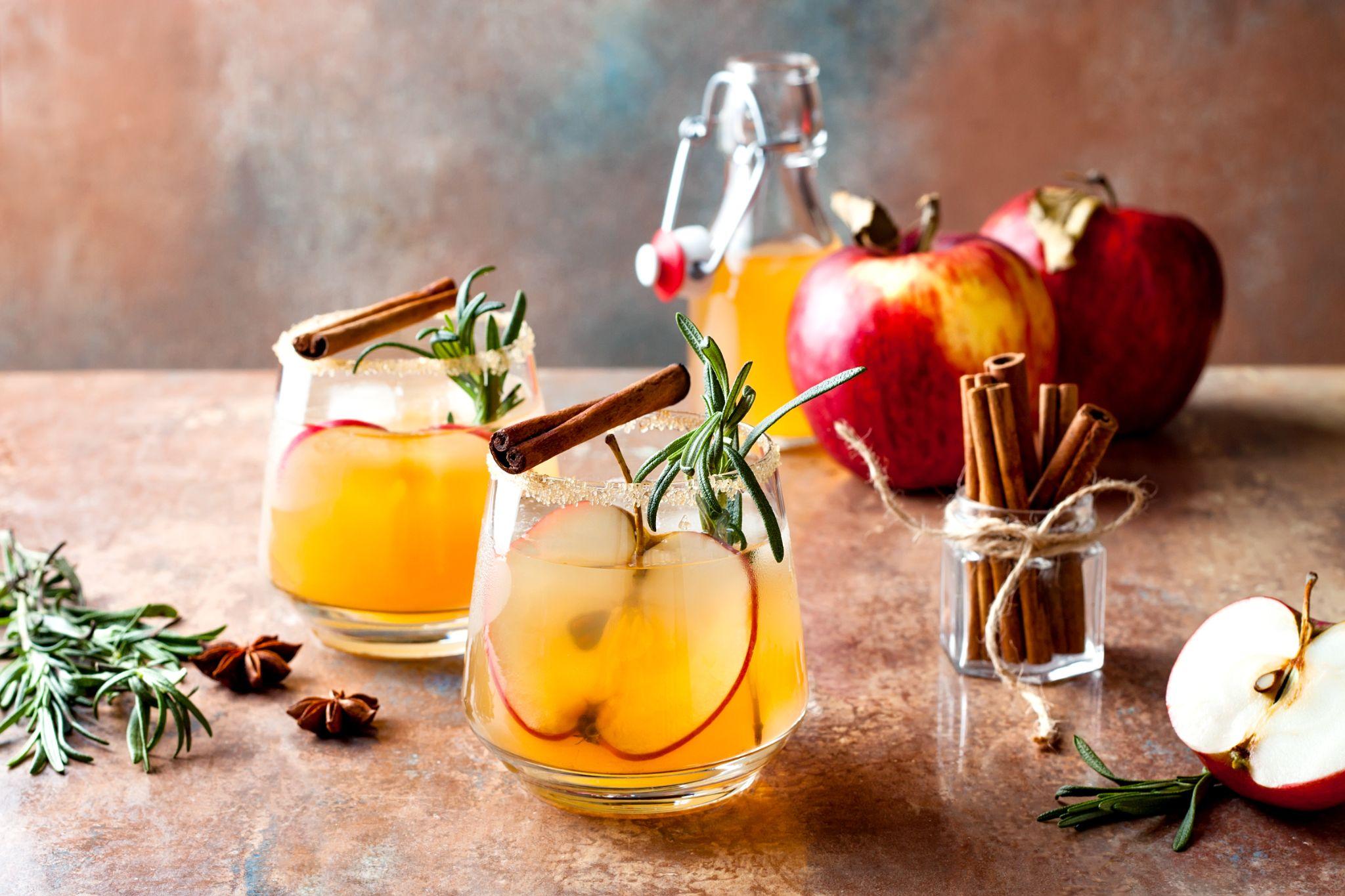
6. Pomegranate Mint Mocktail
This vibrant and refreshing mocktail combines the tartness of pomegranate with the cooling effect of mint, making it a perfect palate cleanser between courses.
Ingredients:
- ½ cup pomegranate juice
- ¼ cup fresh mint leaves
- Sparkling water
- Ice
- Pomegranate seeds and mint leaves for garnish
Instructions:
- Muddle the mint leaves in the bottom of a glass.
- Add pomegranate juice and ice.
- Top with sparkling water and garnish with pomegranate seeds and mint.
7. Ginger Apple Cider Punch
This punch brings together the warmth of ginger with the crispness of apple cider, perfect for a large Thanksgiving gathering.
Ingredients:
- 2 cups apple cider
- 1 tbsp fresh ginger, grated
- ½ cup lemon juice
- Ice
- Apple slices and lemon wedges for garnish
Instructions:
- Combine the apple cider, ginger, and lemon juice in a pitcher.
- Serve over ice, and garnish with apple slices and lemon wedges.
8. Cranberry Ginger Smash
A refreshing blend of cranberry and ginger, this mocktail has a tart yet slightly spicy kick that’s great for a crisp Thanksgiving day.
Ingredients:
- 1 cup cranberry juice
- ½ cup ginger ale (non-alcoholic)
- Ice
- Fresh cranberries and mint leaves for garnish
Instructions:
- Pour the cranberry juice and ginger ale into a glass over ice.
- Stir well and garnish with cranberries and mint leaves.
9. Rosemary Lemon Sparkler
The earthy flavor of rosemary adds an unexpected twist to this citrusy drink, making it both sophisticated and seasonal.
Ingredients:
- 1 cup lemonade
- 1 sprig fresh rosemary
- Club soda
- Ice
- Lemon slices and rosemary for garnish
Instructions:
- Muddle the rosemary in a glass.
- Add the lemonade and ice, then top with club soda.
- Garnish with a lemon slice and a sprig of rosemary.
10. Cider & Thyme Mocktail
This simple yet elegant mocktail combines the fall favorite—apple cider—with the herbal notes of thyme, making it an ideal drink for your Thanksgiving feast.
Ingredients:
- 1 cup apple cider
- 1 sprig fresh thyme
- Sparkling water
- Ice
- Thyme sprig for garnish
Instructions:
- Muddle the thyme in a glass.
- Add apple cider and ice, then top with sparkling water.
- Garnish with a sprig of thyme.
Lumina Recovery Is Here to Support You This Thanksgiving
These mocktail recipes offer a festive and alcohol-free way to celebrate Thanksgiving with your family and friends. They’re perfect for anyone looking to maintain their sobriety while still enjoying the flavors of the season. By focusing on creative, flavorful ingredients, you can elevate your holiday without the need for alcohol.
For those looking to maintain their sobriety while enjoying the holidays, Lumina Recovery offers telehealth and outpatient programs, providing flexible support so you can stay on track with your recovery—even during Thanksgiving festivities.
If you or a loved one is navigating sobriety, contact Lumina Recovery to get the support you need this holiday season.

7 Ways to Support a Loved One’s Sobriety During the Holidays
The holidays are often seen as a time of joy, togetherness, and celebration. However, for those who are newly sober, the festive season can be filled with anxiety, triggers, and challenges.
If your loved one is in recovery, especially during the holidays, they may face unique stressors that can make maintaining their sobriety difficult.
As a family member or friend, you play a crucial role in their support system. Understanding how to support someone’s sobriety with care, compassion, and awareness can make all the difference in their sobriety journey.
Understanding the Challenges of Holiday Sobriety
For someone who is newly sober, the holidays may present a mix of emotions. The season is often filled with social gatherings where alcohol is present, and for some, this can trigger memories of past behaviors or temptations.
Additionally, the holidays can evoke feelings of loneliness, stress, or sadness, especially if your loved one is reflecting on strained relationships or losses experienced due to their addiction.
Recognizing these challenges is the first step toward helping your loved one maintain their sobriety during the holidays. Offering your support in a way that respects their boundaries and emphasizes their recovery can have a lasting positive impact.
1. Create a Sober-Friendly Environment
One of the most meaningful ways to support your loved one’s holiday sobriety is by creating a welcoming, sober-friendly environment. If you’re hosting a holiday gathering, consider limiting or eliminating alcohol, or at the very least, providing non-alcoholic options. This gesture signals to your loved one that their sobriety is important to you.
In addition, try to plan activities that don’t center around drinking. Instead of a cocktail hour, you might organize a holiday movie night, a cookie-baking session, or a game night.
By focusing on activities that bring joy and connection without the presence of alcohol or other substances, you help make the holidays more enjoyable and less stressful for someone in recovery.
2. Communicate Openly and Without Judgment
It’s important to let your loved one know that you support them in their recovery journey. Have an open conversation about how they’re feeling leading up to the holidays and ask them what they need from you. Some people may feel anxious about attending gatherings, while others may want to discuss ways to handle potential triggers.
Be sure to listen without judgment and offer reassurance that they don’t have to face these challenges alone. Simple statements like, “I’m proud of you for focusing on your sobriety” or “How can I support you during the holidays?” can go a long way in showing your love and care.
This type of communication strengthens trust and allows your loved one to feel safe during a time that may otherwise be overwhelming.
3. Be Mindful of Triggers
Triggers can come in many forms during the holiday season, whether it’s seeing people from the past, feeling pressured by social norms, or being in environments where alcohol and substances are easily accessible. When someone is newly sober, these triggers can make them feel vulnerable.
One way to help is by being aware of potential triggers and working to minimize them. If you know that a certain holiday tradition or family member might bring up difficult emotions, consider modifying the event or giving your loved one the option to opt out without guilt.
Let them know it’s okay to set boundaries and prioritize their mental and emotional well-being during the holidays in recovery.
4. Offer Emotional Support
The holidays can stir up complex emotions for your loved one, especially if they are reflecting on the past. Feelings of shame, guilt, or regret may surface, particularly in family settings. Offering emotional support in a compassionate and understanding way can help your loved one process these feelings in a healthy manner.
Let them know that it’s okay to feel whatever emotions arise and that they don’t have to face them alone. Sometimes, a simple act of being present, lending a listening ear, or offering words of encouragement can be incredibly powerful.
Remind them that their progress is worth celebrating and that they’ve come a long way in their recovery journey.

5. Help Them Stick to Their Recovery Plan
If your loved one is working a recovery program, they likely have tools and strategies in place to help them stay on track. One of the best ways to support someone’s sobriety during the holidays is by helping them stick to that plan.
This might mean checking in with them regularly, encouraging them to attend recovery meetings, or providing a quiet space if they need a moment of peace.
If they’re traveling to visit you, ensure they have access to local support groups or virtual meetings, as continuing their routine can be essential to maintaining sobriety during the holidays.
6. Respect Their Boundaries
Respect is a key element of supporting a loved one who is newly sober. While you may have the best intentions, it’s important to honor your loved one’s boundaries.
They may choose to decline invitations to certain gatherings or opt out of traditions that were once a part of their life. Recognize that these decisions are not personal but rather a necessary step in their recovery.
Encourage your loved one to communicate their boundaries clearly, and assure them that you respect their choices. This level of understanding helps foster a healthy, supportive environment where your loved one feels empowered to prioritize their sobriety.
7. Be Prepared for Setbacks
While we hope the holiday season will go smoothly, it’s important to be prepared for the possibility of setbacks. Relapse is a common part of the recovery process, and it doesn’t mean that your loved one has failed.
If a relapse occurs, approach the situation with compassion and without blame. Encourage them to reach out to their support network and remind them that it’s never too late to get back on track.
Understanding that holidays and recovery can be challenging is key to offering the right kind of support. Let your loved one know that you believe in their ability to regain control and continue their sobriety journey, no matter what obstacles arise.
Help Your Loved One Stay Sober This Holiday Season With Lumina Recovery
The holidays are a time of celebration, but for someone who is newly sober, they can also be a time of heightened stress and temptation. By creating a supportive environment, communicating openly, respecting boundaries, and helping your loved one stay focused on their recovery, you can make the holiday season a more positive and manageable experience.
Lumina Recovery offers a range of therapy services and dual diagnosis programs designed to address the unique challenges individuals face during the holiday season, providing the support they need to stay strong in their sobriety journey.
For professional support and guidance during this important time, contact Lumina Recovery today.

10 Tips for Navigating Your First Sober Thanksgiving
Thanksgiving is a time for family, friends, and food. However, it can also be a source of stress and anxiety, particularly if you are navigating your first sober Thanksgiving. The holiday often comes with traditions that may have previously involved alcohol or triggers that can challenge your commitment to sobriety.
However, with the right preparation, your first Thanksgiving sober can be a rewarding and enjoyable experience. Here are some sober Thanksgiving tips to help you manage the day confidently and stay focused on your recovery.
1. Plan Ahead for Triggers
Being prepared for potential triggers is one of the most important aspects of successfully navigating your first sober Thanksgiving. Identify what typically makes you feel stressed or tempted to drink, whether it’s certain people, family dynamics, or the presence of alcohol at the gathering. By recognizing these challenges ahead of time, you can create a plan to avoid them or respond in a healthy way.
Make a list of possible triggers and coping strategies, such as taking a walk, calling a friend, or practicing deep breathing if you feel overwhelmed.
2. Bring Your Own Non-Alcoholic Drinks
One of the simplest ways to ensure you don’t feel left out at holiday gatherings is to bring your own non-alcoholic beverages. Having something in your hand, whether it’s sparkling water, a festive mocktail, or a favorite soda, can help you feel more at ease in social situations where alcohol is being served.
Prepare a fun non-alcoholic drink that you can look forward to enjoying, like a spiced cider or a non-alcoholic punch. This can add to the celebratory mood while keeping you on track with your sobriety goals.
3. Practice Self-Care Before the Big Day
Thanksgiving can be emotionally draining, especially if it’s your first Thanksgiving sober. To prevent feeling overwhelmed, focus on self-care in the days leading up to the holiday. Prioritize activities that help you feel grounded, such as exercise, meditation, or spending time with supportive friends.
Create a routine that helps you manage stress, and be sure to schedule some time for yourself during the holiday to relax and recharge.
4. Set Boundaries
Setting boundaries is essential to maintaining your sobriety, particularly when you’re in social situations where alcohol is present. If certain conversations or individuals tend to trigger you, it’s okay to excuse yourself or redirect the conversation. Being upfront about your needs can also help reduce tension.
Practice saying “no” politely but firmly if someone offers you alcohol, and don’t hesitate to leave a situation if it becomes too overwhelming. Remember, protecting your sobriety is the priority.
5. Have an Exit Strategy
It’s important to have a plan for leaving early if you begin to feel uncomfortable. While we all want to enjoy the holiday with loved ones, staying in a triggering environment could jeopardize your sobriety. By arranging your own transportation or having someone available to pick you up, you’ll feel more secure knowing you can leave if needed.
Let a trusted friend or family member know ahead of time that you may leave early, or ask someone to check in with you throughout the event. Having that accountability can be reassuring during your first sober Thanksgiving.

6. Stick to Your Support System
You don’t have to face the holiday alone. Your support system, whether it’s a sponsor, close friend, or family member, can provide the encouragement you need to get through the day. If possible, reach out to them both before and after the event for guidance or simply to talk through any anxieties you may have.
Schedule a check-in with a supportive friend or recovery group either before or after the gathering to discuss your feelings. Knowing that someone is available to listen can help you feel less isolated.
7. Focus on Gratitude
Thanksgiving is a time to reflect on what you’re grateful for, and this can be especially meaningful in sobriety. Take a few moments to think about the positive changes in your life since becoming sober. Focusing on gratitude can shift your perspective and help you stay motivated throughout the holiday.
Write down a list of things you’re thankful for, especially those related to your recovery journey. Keeping this list handy can serve as a reminder of why you chose to embark on this path.
8. Limit Your Time in High-Risk Environments
If you know that certain parts of the day will be more difficult for you to manage, such as a cocktail hour or an after-dinner drink tradition, plan to limit your time in those situations. It’s okay to step away, take a break, or leave early if you feel like the environment is becoming too much to handle.
Arrange your schedule so that you can attend the most meaningful parts of the day, such as dinner or a special family activity, while avoiding riskier moments.
9. Be Honest With Loved Ones
One of the best ways to navigate a sober Thanksgiving is to be open about your sobriety with those closest to you. If you feel comfortable, share your recovery story and let your family or friends know that this is your first sober Thanksgiving. In most cases, people will be understanding and do their best to accommodate you.
Frame the conversation by highlighting the positive aspects of your recovery and how staying sober helps you move forward. This not only reinforces your commitment to yourself but also invites loved ones to be part of your journey.
10. Celebrate Your Sobriety
Finally, don’t forget to celebrate this milestone! Your first Thanksgiving sober is a huge accomplishment and something to be proud of. Treat yourself to something special or plan a fun, sober-friendly activity after the holiday. Recognizing your progress will motivate you to continue thriving in your recovery.
Make post-Thanksgiving plans that you can look forward to, such as a movie night with friends, a relaxing spa day, or a trip to the park. These rewards will help reinforce the benefits of sobriety during the holiday.
Find the Help You Need This Holiday Season With Lumina Recovery
Your first sober Thanksgiving can bring a mix of emotions, but by preparing ahead, setting boundaries, and leaning on your support system, you can successfully navigate the day while maintaining your sobriety. Remember, it’s perfectly okay to take things one step at a time. By using these sober Thanksgiving tips, you’ll not only make it through the holiday but also grow stronger in your recovery journey.
Lumina Recovery offers telehealth and outpatient services, providing continuous support and flexibility, which can be especially helpful as you navigate potential triggers and stressors during your first sober Thanksgiving.
If you need additional support or guidance, don’t hesitate to contact Lumina Recovery—we’re here to help you every step of the way.
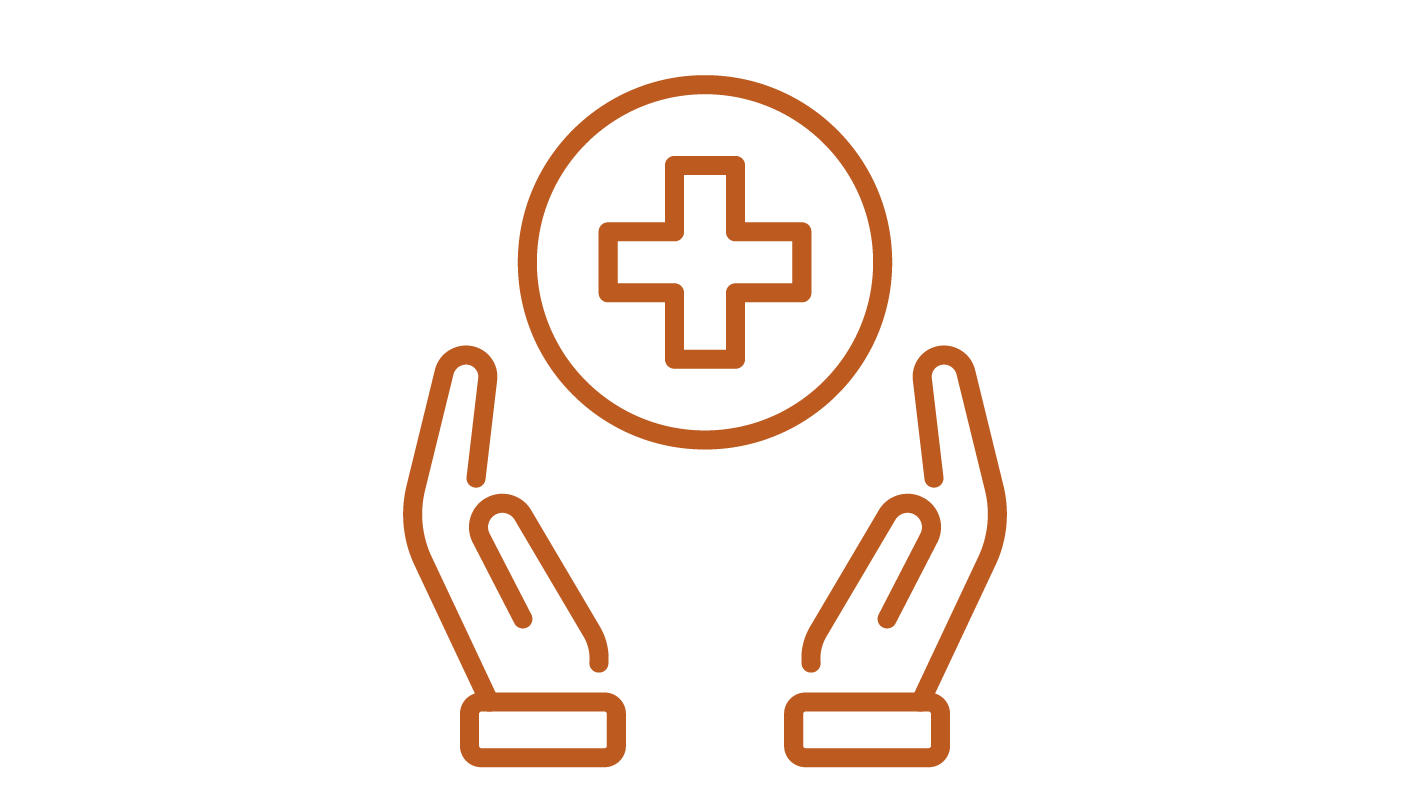
A Brief Overview of Drug and Alcohol Detox
Detox is the essential first step in overcoming addiction to drugs or alcohol. It involves eliminating toxic substances from the body to help the individual stabilize before beginning long-term treatment. Medically supervised detox is especially important, as it ensures safety and comfort during this critical phase.
Why Is Detox Important?
Detox helps break the physical dependence on drugs or alcohol, allowing your body to begin the healing process. By minimizing withdrawal symptoms and preventing severe complications, medically supervised detox offers the safest way to manage the challenges of quitting.
Who Should Seek Supervised Detox?
Detox is ideal for anyone physically dependent on substances or struggling to quit on their own. It’s especially crucial for long-term users or individuals at risk of severe withdrawal symptoms. For those seeking a safe and supportive start to recovery, supervised detox offers professional guidance and care.
How Long Does It Take to Detox From Alcohol or Drugs?
Detox for drugs and alcohol typically lasts 3 to 10 days, depending on the substance and individual health factors. During this time, medical professionals provide care to manage symptoms and ensure a smooth transition into further treatment.
Common Detox Symptoms
Symptoms of drug and alcohol detox vary based on factors like length of abuse, type of substance used, and individual health, but common symptoms include:
- Anxiety: Feelings of restlessness or unease, often linked to withdrawal stress.
- Nausea/Vomiting: The body’s reaction to substance withdrawal, leading to stomach discomfort.
- Tremors or Shaking: Involuntary shaking, commonly due to nervous system overstimulation.
- Insomnia: Difficulty sleeping as the body adjusts to functioning without substances.
- Sweating: Excessive perspiration, often caused by the body’s effort to detoxify.
- Irritability: Heightened sensitivity and mood swings due to chemical imbalances during detox.
Your Recovery Starts Here
At Lumina Recovery, our medically supervised detox programs help you safely and comfortably begin your journey to sobriety. Our expert team offers personalized care to manage withdrawal symptoms and guide you through the detox process. With our comprehensive rehabilitation programs, you’ll receive the ongoing support needed for long-term recovery. Contact us today to take the first step toward a healthier, substance-free life.


Drug Smell Quick Guide
Being able to identify certain drug smells can be an important tool in recognizing substance use. Many drugs have distinct odors that can help determine if someone close to you may be using them. This quick guide provides an overview of the common smells associated with several popular drugs.
What Do Drugs Smell Like?
Different drugs have different smells, and recognizing these odors can help you identify potential substance abuse. While some are more subtle, others can be quite pungent. Understanding these scents can be a first step toward addressing possible drug addiction issues. Below are the common smells of several well-known drugs.
Heroin
Heroin typically has a strong, vinegar-like odor due to the kinds of chemicals used in its production. This smell may be more prominent when it’s smoked, giving off a burnt or acidic scent.
Fentanyl
Fentanyl has a less distinctive smell than other drugs, but when mixed with heroin or other substances, it may carry the same strong, chemical-like scent. This can make this particular drug harder to identify by smell alone.
Meth
Methamphetamine, especially when smoked, emits a sharp chemical or ammonia-like odor. Some people compare it to the smell of cleaning products or cat urine.
Marijuana
Marijuana has a skunky, earthy scent that is very strong and unmistakable. When smoked, it can also leave a sweet, herbal smell lingering on clothing or in the air.
Crack
Crack cocaine, when smoked, produces an acrid, chemical odor similar to burning plastic. This pungent smell can often cling to clothes and linger in rooms.
Cocaine
Powdered cocaine typically has a mild chemical smell, often described as similar to gasoline or paint thinner, though it is not as strong as other drugs.
Get Help for Substance Abuse at Lumina Recovery
If you notice any of these unique drug smells and suspect a loved one has an addiction, Lumina Recovery is here to help. Our compassionate and professional treatment programs provide the support needed to overcome addiction. Call us at (877) 716-7515 today to learn more and take the first step toward recovery.
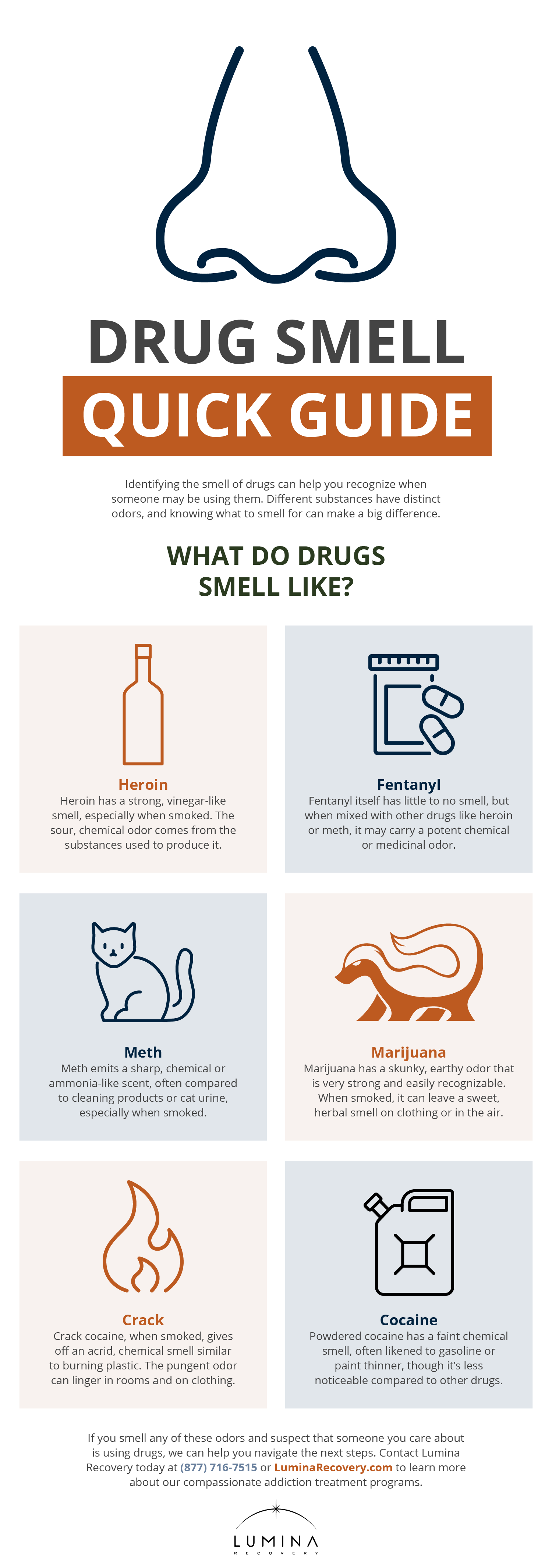
Additional Resources
Once you have completed your rehabilitation program at one of our drug and alcohol treatment centers, you should try to surround yourself with people who can encourage you to stay sober. Many people find that support groups are the best source of encouragement. You can find hundreds of support groups and meetings in your community. Our drug addiction treatment centers stress the importance of personal chemical dependency resources, especially when you are new to sobriety. Below are various addiction and mental health resources for people in recovery who want additional support.
Christian Addiction Recovery Resources
Our substance abuse services aren’t limited to specific programs, but rather we believe in the importance of incorporating faith-based programs to promote spiritual healing, like our Faith in Recovery program.
With that said, below are some faith-based addiction recovery resources that could help you in your spiritual healing from addiction:
- Battlefield of the Mind by Joyce Meyer
- Boundaries by Dr. Henry Cloud & Dr. John Townsend
- Christian Families in Recovery: A Guide for Addiction, Recovery, and Intervention Using God’s Tools of Redemption by Robert and Stephanie Tucker
- Club New Life Christian Ministry for Addiction and Recovery
- Lost & Found: Recovery in Christ by Bruce Stanley
- Overcoming Emotional Obstacles through Faith: Navigating the Mind Field by Anthony Acampora, Director of Banyan’s Faith in Recovery Program
- The Case for Christ by Lee Strobel
Mental Health Resources for Recovery
Lumina Recovery consist of both mental health and substance abuse treatment facilities, meaning we offer mental health resources as well as chemical dependency resources. What’s more, addiction often co-occurs with mental illness, making these resources ever more important.
Below are some resources for mental health recovery that can help you or your loved one:
- This Emotional Life video series
- No Kidding, Me 2!! with Joe Pantoliano
- Dare: The New Way to End Anxiety and Stop Panic Attacks by Barry McDonagh
- Pleasure Unwoven: An Explanation of the Brain Disease of Addiction by Kevin McCauley
- Declutter Your Mind: How to Stop Worrying, Relieve Anxiety, and Eliminate Negative Thinking by S.J. Scott and Barrie Davenport
Call Us Today – (877) 716-7515

